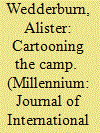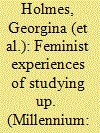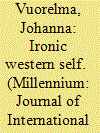|
|
|
Sort Order |
|
|
|
Items / Page
|
|
|
|
|
|
|
| Srl | Item |
| 1 |
ID:
164496


|
|
|
|
|
| Summary/Abstract |
Over the last 30 years, post-structuralist, feminist and other IR theorists have asked questions of the ways in which discourses on sovereignty seek to foreclose political possibility. To do so, they have advanced a decentralised, contested, incomplete and relational understanding of politics that presupposes some sort of intersubjective agency, however fragmented. There is one site, however, that appears to confound this line of argument insofar as it is commonly understood to exemplify an entirely non-relational, anti-political ‘desolation’: the concentration camp. Drawing on feminist theory to establish the terms of an aesthetic mode of ‘interruption’, this article will identify a compelling challenge to this position in a comic book drawn by Horst Rosenthal, a German–Jewish detainee at Gurs in Vichy, France, who was later killed at Auschwitz–Birkenau. Rosenthal’s piece will be read as an ‘aesthetic interruption’ that mounts a powerful critique of the logic underpinning his concentrationary experience, and in so doing demonstrates one way in which (to however painfully limited a degree) the political might be ‘brought back in’ to discussions about sovereign power.
|
|
|
|
|
|
|
|
|
|
|
|
|
|
|
|
| 2 |
ID:
164498


|
|
|
|
|
| Summary/Abstract |
This article makes the case for feminist IR to build knowledge of international institutions. It emerges from a roundtable titled ‘Challenges and Opportunities for Feminist IR: Researching Gendered Institutions’ which took place at the International Studies Association Annual Convention in Baltimore in 2017. Here, we engage in self-reflexivity, drawing on our conversation to consider what it means for feminist scholars to ‘study up’. We argue that feminist IR conceptions of narratives and the everyday make a valuable contribution to feminist institutionalist understandings of the formal and informal. We also draw attention to the value of postcolonial approaches and multi-site analyses of international institutions for creating a counter-narrative to hegemonic accounts emerging from both the institutions themselves, and scholars studying them without a critical feminist perspective. In so doing, we draw attention to the salience of considering not just what we study as feminist International Relations scholars but how we study it.
|
|
|
|
|
|
|
|
|
|
|
|
|
|
|
|
| 3 |
ID:
164497


|
|
|
|
|
| Summary/Abstract |
This article focuses on ironic narrative forms in international media and policy debates concerning political developments in Turkey during the era of the Justice and Development Party (Adalet ve Kalkınma Partisi, AKP) in the 2000s. More specifically, the article examines the narrative of ‘losing’ Turkey, which has grown in significance during the AKP era, and argues that the metaphor also contains an ironic, self-critical reading that contributes to the debate on the idea of the West. The article advances knowledge concerning different functions of ironic narratives, proposing that we need to distinguish between (1) radical irony and (2) conservative irony. It is argued that radical irony is an outward-looking strategy to advance social justice and to challenge the Western self’s hegemonic representations, while conservative irony is an attempt to re-strengthen the Western self’s hegemony in the international system. The debate on ‘losing’ Turkey is an illustrative case where a Western subject is intersubjectively imagined and narrated with moral and aesthetic preferences. It can be seen as a negotiation about the moral traditions that underpin the West as an imagined and narrated social system. The article argues that the Western self is partly constituted through ironic narrative forms.
|
|
|
|
|
|
|
|
|
|
|
|
|
|
|
|
|
|
|
|
|